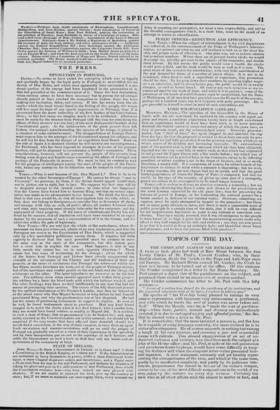LORD WHARNCLIFFE'S GAME-BH.L.
MORNING HLRAI.D.—TIR: rejection of the Game-Bill in the House of Lords will, we are convinced, be received by the country with equal sur- • prise and regret, a confident expectation having been at length entertained that an experiment would at least base been tried, to in some measure
diminish the fruitful source of crime and misery of which the game laws, as
they at present stand, are the acknowledged cause. However, procrasti- nation, that " thief of thee," has again stepped in, and snatched the cup from the lip ; for tisit the proposed afieration in these laws can only be pro- crastinated we feel fully persuaded, from the growing conviction which every where exists of its absolute and increasing necessity. Th extraordinary part of the present case is, that the measure which has thus been ultimately rejected was the very same bill, or nearly such, as that which had originated in and passed the Upper 1-louse only a few weeks before ; but which was or necessity thrown out in point of form in time Commons, owing to its inflicting penalties, or rather creating a tax in the shape of licences, and in so much", therefore, a money-bill. It is competent, of course, for either branch of the Legislature to change its mind while a measure is depending; but we wish, fer many reasons, the present change had not occurred, arid tire the great landed proprietors, of which the House of Peers is composed, had had the credit, in the eyes of the country, of giving up some part of a monopoly, grown too odious in its consequences to be much longer retained.
T1 ES.-1 t is useless to discuss an abortive measure, a nonentity ; but we cannot help observing that there is more zeal shown in the preservation of the rural tyranny conceded by the eld game laws, than for preserving the balance of power in Europe, or for husbanding the national powers for a future contest in defence of our national rights. • However, something, we suppose, must be again attempted in respect to the game-laws ; but there are so many petty interests to serve, and there is such a lamentable want of 'public principle in a certain class of the state, that it will be very difficult for our magnanimous legislators to come to any rational or consistent .con- elusion. They have mainly asserted, that it was advantageous to the people to have bread at so high a price that the manufacturing artisan could only afford to buy half enough for his wife and children : can they not now prove to us that it is useful to keep up midnight fights and bloodshed about hares and pheasants, and to have our prisons filled with poachers ?


















 Previous page
Previous page